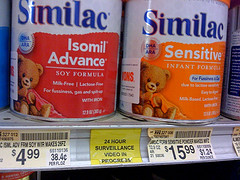Formulas can come ready-to-use, powdered or in concentrated liquid form. The ready-to-use formulas are often the most expensive. Always discard what the baby doesn’t drink; most formulas recommend not refrigerating the leftovers. Powdered formulas are the most common, simply mix the suggested amount of dry mix with the recommended amount of water and shake until dissolved. Concentrated liquid formulas must also be mixed with water prior to feeding the baby.
Formulas can be sold under several different brand names or as generic brands. Any formulas sold in the United States must meet strict nutritional standards mandated by the FDA. This standard includes a minimum nutritional requirement and a maximum requirement. Even generic brands must adhere to these guidelines.

Most formulas are fortified with iron. This is very important as babies need iron for proper growth and development. Some formulas are enhanced with DHA (dacosahexaenoic acid) and AHA (arachidonic acid). These are both types of omega-3 fatty acids found in breast milk and certain foods. Formula makers often market the benefits of DHA and AHA. The truth is that there is no scientific research to prove that adding these components to formula will make any difference to the baby’s growth or development.
Choosing a baby formula carefully is important if you’re not breastfeeding. If you have any questions about what your baby does or doesn’t need check with your doctor. Once you start a certain brand or kind of formula don’t change it unless your baby reacts poorly to it. Always throw formula out if it is past the expiry date as it will begin to lose nutritional value.
Thank-you for reading this post. Please feel free to leave your thoughts in the comment section below.
Infant formula: your questions answered. (2010, October 16). Retrieved from http://www.mayoclinic.com/health/infant-formula/PR00058